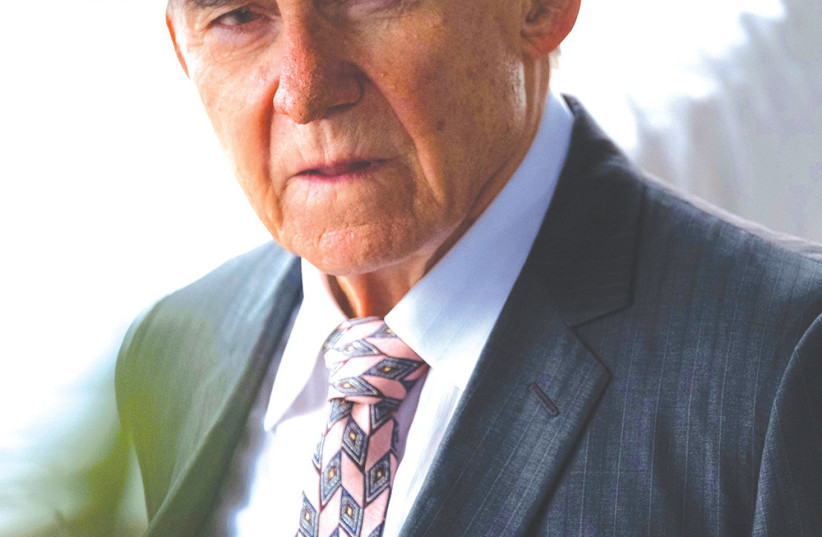"When you lose your money, you lose nothing. When you lose your health, you lose something. When you lose your character, you lose everything,” are words of wisdom you might not expect to hear from an aging gangster, but this quote has been attributed to Meyer Lansky.
Harvey Keitel, who portrays the legendary Jewish mobster in the new biopic Lansky, which opens throughout Israel on March 3, utters these words in this compelling film. Keitel has played many tough guys throughout his career, but it is hard to think of a role in which he has been better. This performance is a triumph that caps his many years of wonderful work and if you have any uncles or acquaintances from that Jewish-mobster world, he will certainly remind you of them with every gesture and inflection. He is completely convincing and it is a joy to watch him in this meaty role.
Lansky is directed by Eytan Rockaway, who co-wrote the script with his father, Robert Rockaway, a professor emeritus of Jewish history at Tel Aviv University and an expert on the heyday of Jewish gangsters in the US. The details of the story are well observed and feel true.
The film is divided into two parts. One is set in the early 80s, when journalist David Stone (Sam Worthington from Avatar, who struggles mightily with what I think is meant to be a New York accent), a fictional character who is apparently an amalgam of Lansky biographers and interviewers, tracks down the former mob legend to Miami Beach and convinces Lansky, who has recently found out he has terminal cancer, to tell his story. The other part of the movie is Lansky’s early life, told in flashbacks from his childhood to middle age.
The scenes where the journalist and Lansky sit in a diner and Lansky talks about his life are the highlight of the film. Keitel’s performance highlights the contrasts in the elderly gangster’s personality: The friendly, haimish old man, who loves to chat with waitresses and grills the young journalist about his life on the one hand, and the ruthless criminal, who would do whatever was necessary to preserve his empire, on the other. Keitel’s on-screen persona has always blended a certain regular-guy quality with a sense of real menace, which makes him perfect for this character, much as James Gandolfini was just right for Tony Soprano. And while the story of his life is fascinating, Lansky’s insights – like the quote about losing your character – and the spin he puts on different aspects of his career as he looks back are far more memorable than any of the scenes of mob life from decades earlier.

The flashbacks in this ambitious film go back to when Lansky, an immigrant kid obsessed with numbers, learns how to rig a dice game. John Magaro, who recently appeared in The Many Saints of Newark, plays Lansky as a young man and he is very good. David Cade is blander as Bugsy Siegel. The movie details how Bugsy and Lansky crushed their rivals and teamed up with Lucky Luciano (Shane McRae). Eventually, Lansky moves into Cuba, where he is especially successful and sends money straight from the casinos to Jews fighting to establish the state of Israel.
The saga of Lansky’s flight to Israel in the early 70s to escape criminal prosecution in the US is also part of the story. The film makes it clear throughout that Lansky’s Jewish identity was central to him and that when Israel deported him back to the US about two years later, for Lansky it was a deeply personal betrayal. The film implies the Israelis did not hesitate to take his money when they needed it, but they were not there to shelter him when he needed it.
Throughout, Lansky seems to achieve more by using his brains than through violence. It is his combination of business acumen and his ability to keep his emotions in check that allow him to build his empire. He was eventually found innocent on all serious charges and the US government tried for years but failed to find the money they alleged he had stashed.
Anna Sophia Robb (The Carrie Diaries) is appealing as Lansky’s wife, who is upset at the way her husband makes a living and gradually falls apart. Lansky is portrayed as a devoted father to a son with cerebral palsy.
While the portrayal of his early life is well done, we have seen similar scenes in classic films, such as The Godfather series and Martin Scorsese’s Goodfellas, and television shows, such as The Sopranos and Boardwalk Empire, too many times to respond to them as if they were fresh.
The journalist character is a down-on-his-luck freelancer, whose desperation for one big story that he can turn into a bestselling book is meant to parallel the desperation that fueled Lansky’s ambitions. Worthington, in spite of his trouble with the accent, gives a credible performance, but his story – he calls his kids, argues with his estranged wife and gets involved in a relationship with a gorgeous guest (Minka Kelly) who is staying at the motel with him – is not particularly memorable. A subplot about the feds pressuring the journalist to try to get Lansky to reveal $300 million dollars he supposedly has stashed away is promising, but loses speed. During the flashback scenes and the journalist’s story, I was usually impatient to get back to Keitel and Lansky’s reflections on life. Watching Keitel’s face as all kinds of emotions pass across is more dramatic than anything else in this movie.
